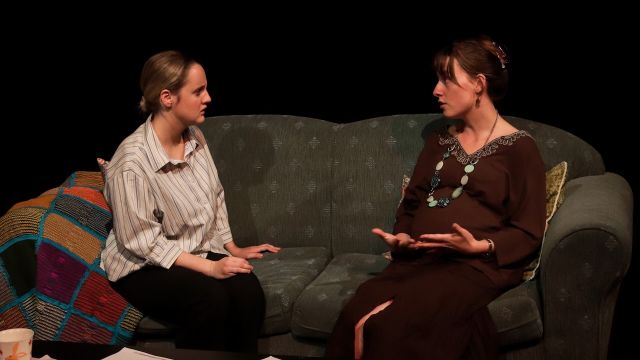Mosquitoes
A woman visits her scientist sister in Geneva. Alice, the Swiss-based sibling, is focused entirely on her work at the Large Hadron Collider, ignoring her teenage son. Jenny is dealing with the grief of losing a child to a disease preventable by a vaccine she didn’t trust.
Neither woman has their child’s father in their lives – nor has their ageing mother, Karen, who is long divorced from their father and needing increasing care, has accompanied Jenny to Geneva.
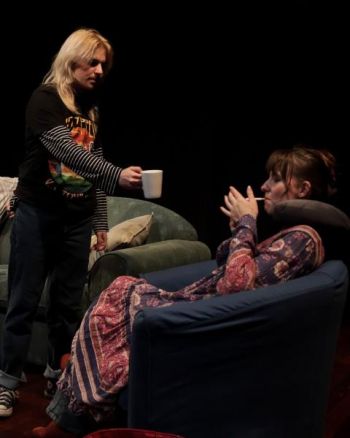 Alice’s son Luke doesn’t fit – he’s one of only two English speakers at his school and being bullied leads to a violent reaction. His only friend is the gregarious Natalie, who flits and flips, and communicates more through her mobile phone than in a face-to-face conversation.
Alice’s son Luke doesn’t fit – he’s one of only two English speakers at his school and being bullied leads to a violent reaction. His only friend is the gregarious Natalie, who flits and flips, and communicates more through her mobile phone than in a face-to-face conversation.
On the surface, the narrative by English playwright Lucy Kirkwood explores the interplay of opposites: experiments to experience, kind twists to cruel, quiet becomes loud. However, as the story develops, it’s clear this is not to demonstrate the dichotomy, more to show that each person is not only capable of being both but is always a complex combination of each and everywhere in between.
The piece is overwhelmed by themes: it also explores love, faith, family, adolescence, and the brutality of getting old. The story’s context is the morality and sometimes arrogance of science: shouting about the wonders of discovering something that just has to be there because scientists found a gap they couldn’t explain, whilst downplaying the admittedly miniscule risk of destroying the universe.
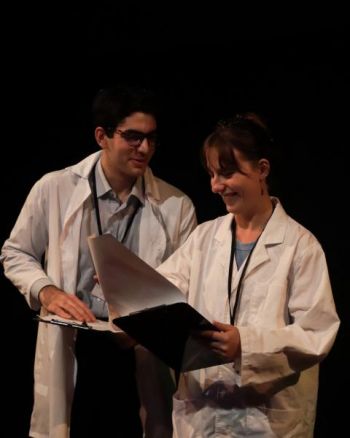 As the rational, logical Alice, Lily Koch projects the confidence of someone who has the data to back her up yet shows the vulnerability of a woman who knows the numbers aren’t everything. Particularly in the second act, Koch is outstanding with her facial movements, twitches, glances and anxiety coming from Alice’s uncertainty, bringing colour to the character, and when her calmness explodes, Koch expertly reveals a woman who can be utterly dislikeable, yet one with whom we can identify.
As the rational, logical Alice, Lily Koch projects the confidence of someone who has the data to back her up yet shows the vulnerability of a woman who knows the numbers aren’t everything. Particularly in the second act, Koch is outstanding with her facial movements, twitches, glances and anxiety coming from Alice’s uncertainty, bringing colour to the character, and when her calmness explodes, Koch expertly reveals a woman who can be utterly dislikeable, yet one with whom we can identify.
Airlie Windle’s Jenny is a brilliant chemical reaction to her sister’s well-researched logic, quoting news reports, hearsay, becoming more agitated with each of Alice’s dismissals. Whilst Jenny struggles with joining the dots logically, Windle shows how she builds connections emotionally – and her expressive highs and lows are superbly nuanced to take the audience on the journey. Writer Kirkwood has created identifiable imperfections in her rivalling protagonists.
Lily Watkins as the sisters’ mother has some of the best lines, and Watkins is great at delivering high comedy with a perfectly straight face, and successfully portrays the sadness and regret of being a great female scientist in a time when only the men got the recognition.
Amy Liew’s Natalie convincingly balances the meek and mean of being a popular high school student, and Ashi Mashoof’s Henri, Alice’s new scientist boyfriend, articulates the complexities of being loyal to his partner whilst trying to remain gracious to her family.
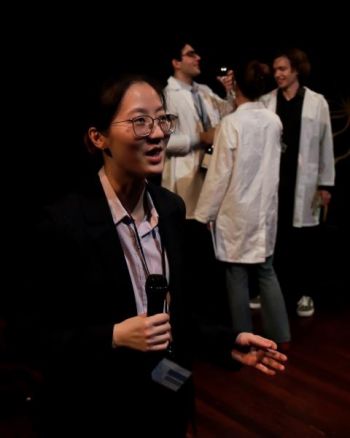 Alice’s son Luke is played by Atticus Chave, and he embodies the adolescent, laptop-absorbed misfit, displaying indifference and discomfort to his mother’s too infrequent attempts to show love. The chemistry with his crush, Natalie, isn’t quite there, but that of Chave and Windle’s Aunt Jenny sparks with ambiguity.
Alice’s son Luke is played by Atticus Chave, and he embodies the adolescent, laptop-absorbed misfit, displaying indifference and discomfort to his mother’s too infrequent attempts to show love. The chemistry with his crush, Natalie, isn’t quite there, but that of Chave and Windle’s Aunt Jenny sparks with ambiguity.
Connecting the scientific dots across the Little Theatre, painted with Taniesha Mottishaw’s beautiful visualisations of spiralling Higgs particles, is Henry Chipperfield, as the Boson. He’s a narrator, largely invisible to the play’s characters and initially, cheerfully, offers context, before spiralling himself into darker thoughts.
Conille Solomon’s sound design is great but needs more of the Higgs Boson soundtrack and should be much, much louder – the slow scene changes would feel less drawn out with more of the ‘mosquitoes’. Ella Anderson does a good job with the limited lighting options of the Little Theatre and achieves some wonderful slow fades and transitions that support the emotions on stage.
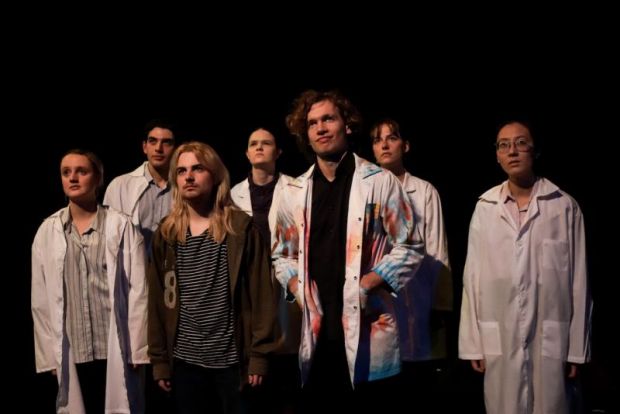
First time director Bella Wheatland has taken on a huge story that says so much and has guided her cast to focus on the humanity, the different dimensions of intelligence it possesses, and how they need to work together rather than against each other. You’ll need to bring your brain to this play, but it still entertains with a surprising amount of humour. All the particles of story and performance will still be accelerating around your mind the next day.
Review by Mark Wickett
Subscribe to our E-Newsletter, buy our latest print edition or find a Performing Arts book at Book Nook.

